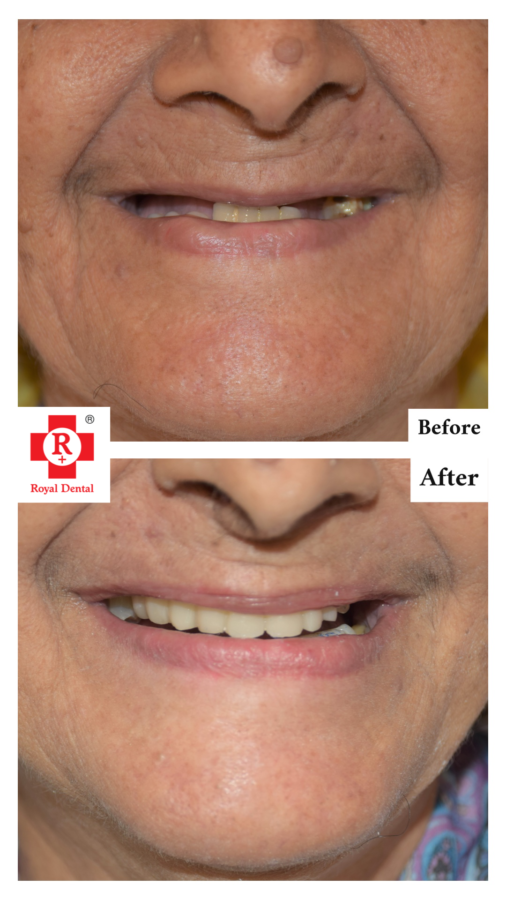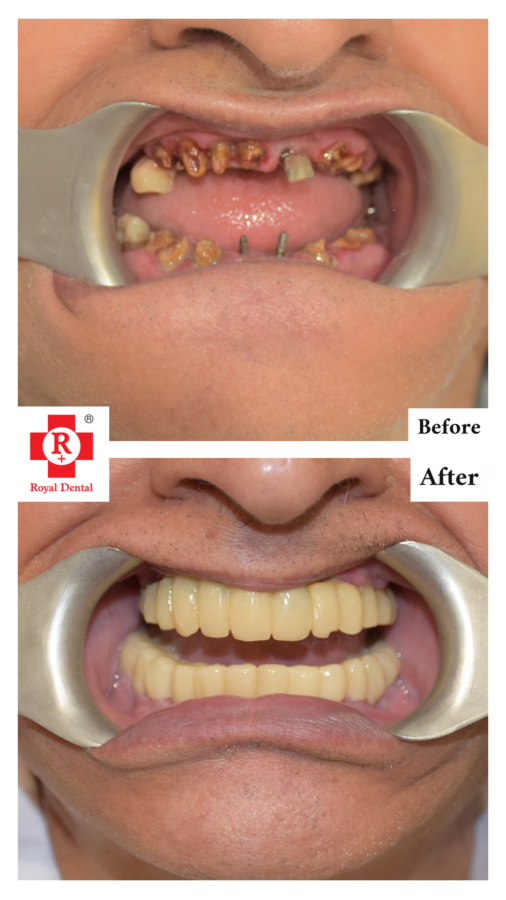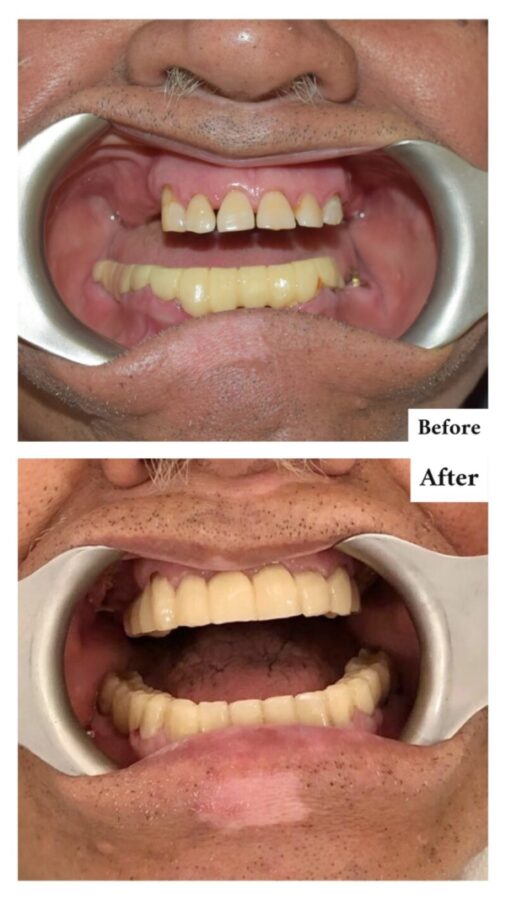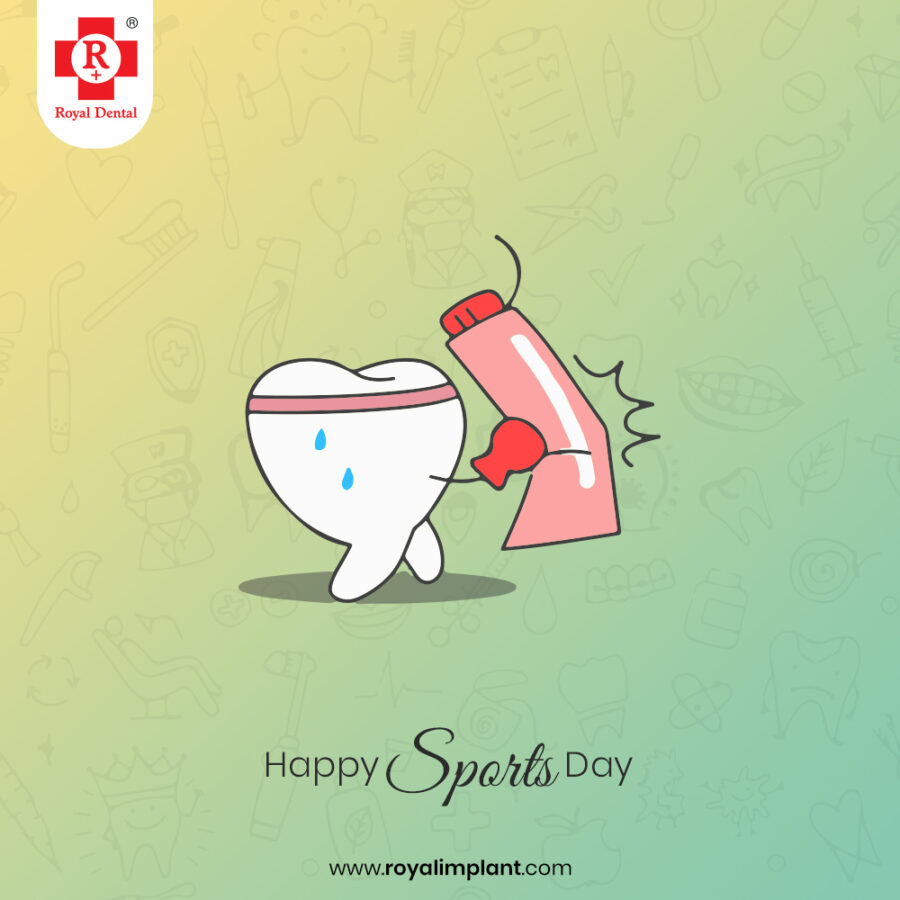Athletes are at a higher risk of dental implant injury due to the physical demands of their sport. Missing teeth can affect their ability to perform at their best, which is where dental implants come in. At Royal Dental Clinics, we understand the importance of dental implants for athletes and offer expert advice on the considerations they need to keep in mind. In this article, we’ll explore the importance of implant for athletes and how they can help you score a winning smile both on and off the field.
Understanding Dental Implant
Before we dive into the benefits of dental implants for athletes, let’s first understand what they are. A dental implant is a small, titanium post that is surgically placed into the jawbone to replace a missing tooth. Once the implant is placed, a crown is attached to the top, giving the appearance of a natural tooth. Unlike dentures, implants are permanent, and with proper care, can last a lifetime.
Types of Sports Injury and need for Implant
Sprains: A sprain occurs when a ligament – the tissue that connects bones to each other – is stretched or torn. Sprains are common in sports that involve sudden stops, changes in direction or jumping, such as basketball, football, and soccer.
Strains: A strain is an injury to a muscle or tendon – the tissue that connects muscles to bones. Strains often occur in sports that involve repetitive motion or overuse, such as distance running or tennis.
Dental injuries: Athletes are also at risk of dental injuries, such as tooth fractures, dislodged teeth, and avulsed teeth. These injuries can occur in any sport but are more common in contact sports like football, boxing, and martial arts.

Fractures: A fracture is a break in a bone. Fractures can be either acute – resulting from a sudden impact or trauma – or chronic, resulting from overuse. Sports that involve contact, such as football and hockey, are more likely to result in fractures.
Dislocations: A dislocation occurs when a bone is forced out of its socket. Dislocations are common in contact sports, such as football and rugby, but can also occur in non-contact sports like gymnastics.
Concussions: A concussion is a type of brain injury that occurs when the brain is jostled inside the skull. Concussions are common in contact sports, such as football and hockey, but can also occur in non-contact sports like soccer and basketball.
Athletes’ Teeth Implant and Injury
Sports injuries can have a significant impact on athletes’ teeth. Whether it’s a contact sport like football or a non-contact sport like gymnastics, athletes are at risk of dental injury and need implant. These injuries can range from minor chips or cracks to more severe damage like tooth loss.
One of the most common dental injuries that athletes experience is tooth fractures. These can occur when a player gets hit in the face, resulting in a chip or crack in the tooth. Tooth fractures can be painful and can affect an athlete’s ability to perform. In some cases, a fractured tooth may need to be extracted, which can impact an athlete’s oral function and appearance.
Another common dental injury is a dislodged tooth, which occurs when a tooth is pushed out of its socket. This can happen when an athlete receives a blow to the face or a sudden impact. A dislodged tooth can be extremely painful and may require emergency dental treatment to save the tooth.



If left untreated, a dislodged tooth can lead to infections and other complications.
Perhaps the most severe dental injury that an athlete can experience is tooth loss and need for implant. This can happen when a tooth is knocked out completely, either due to a blow to the face or a fall. Tooth loss can be a traumatic experience for an athlete, affecting their appearance, self-esteem, and oral function. Dental implants are an excellent solution for athletes who have lost teeth due to sports injuries. They offer a permanent solution to replace missing teeth, restoring an athlete’s oral function and confidence.
Athletes should take steps to protect their teeth during sports. This includes wearing appropriate protective gear like mouth guards, helmets, and face shields. Additionally, athletes should maintain good oral hygiene practices like brushing and flossing regularly and seeing a dentist for regular check-ups.
Benefits of Implant for Athletes with Sports Injury
Appearance: A missing tooth can be a source of embarrassment for athletes, especially those who rely on their appearance for sponsorships and endorsements. A dental implant offers a natural-looking replacement for a missing tooth, restoring an athlete’s confidence and self-esteem.
Improved Function: Dental implants not only improve appearance but also provide the necessary support and function for chewing, speaking, and breathing. This is especially important for athletes who need to maintain optimal physical performance on the field.
Oral Health: A missing tooth can lead to a host of oral health issues, including gum disease, bone loss, and decay. Dental implants help prevent these issues by providing support for the surrounding teeth and jawbone.
Improved Longevity: Unlike dentures, dental implants are a permanent solution for missing teeth. With proper care, dental implants can last a lifetime, making them a cost-effective option for athletes with sports-related dental injuries.
Sports Injury Implant Procedure
Initial Consultation: The first step is to schedule an initial consultation with one of our experienced dentists. During this appointment, your dentist will examine your teeth and gums, review your medical history, and discuss your dental implant goals and expectations.
Treatment Planning: Based on the information gathered during the initial consultation, your dentist will create a personalized treatment plan for you. This plan will outline the number of implants needed, the type of implant, and the placement location.
Implant Placement: The implant placement procedure is typically performed under local anesthesia. Your dentist will make a small incision in your gums to expose the bone beneath, where the implant will be placed. The implant is then inserted into the bone and covered with a protective cap or cover screw.
Prosthetic Tooth Placement: The final step is to place the prosthetic tooth onto the implant. The tooth will be custom-designed to match the shape, size, and colour of your natural teeth, creating a seamless and natural-looking smile. It is placed on the same day as implant placement.
Follow-Up Care: After the procedure, your dentist will provide instructions on how to care for your new dental implant. Regular check-ups and cleanings will be necessary to maintain the health and longevity of your implant.
How Implant helps Athlete perform better after Injury?
Improved Oral Health: Dental implants can help improve oral health by replacing missing teeth and reducing the risk of gum disease and other dental problems. This can lead to better overall health and performance on the field.
Better Nutrition: Missing teeth can make it difficult to eat certain foods, such as fruits and vegetables, which are important for a healthy diet. Dental implants can restore full chewing function, allowing athletes to eat a wider variety of foods and get the nutrients they need to perform their best.
Enhanced Athletic Performance: Dental implants can help athletes perform better by improving their bite alignment and reducing the risk of jaw pain and other dental problems. This can lead to better posture and balance, which can enhance overall athletic performance.

Increased Confidence: Dental implants can help athletes feel more confident both on and off the field. This can lead to better performance and a more positive attitude, which can have a positive impact on overall athletic success.
Improved Speech: Missing teeth can make it difficult to speak clearly, which can be a problem for athletes who need to communicate effectively with coaches and teammates. Dental implants can improve speech clarity and help athletes communicate more effectively.
Dental Implant and Athletic Mouth Guards
Athletic mouth guards are essential pieces of equipment for athletes, as they help protect teeth and prevent dental injuries during contact sports. However, if you have dental implants, you may wonder if you can still wear an athletic mouth guard. Here’s what you need to know about dental implants and athletic mouth guards:
Custom-Fitted Mouth Guards: If you have dental implants, it’s important to wear a custom-fitted mouth guard that is designed specifically for your mouth. This is because a standard, over-the-counter mouth guard may not fit properly over dental implants, which can cause discomfort and even damage to the implants.
Protecting Your Dental Implants: While dental implants are strong and durable, they can still be damaged by impact or trauma. Wearing an athletic mouth guard can help protect your dental implants from damage and reduce the risk of implant failure.
Proper Cleaning: It’s important to clean your athletic mouth guard properly to prevent the buildup of bacteria and other harmful microorganisms. This is especially important if you have dental implants, as infections around the implants can lead to implant failure. Be sure to follow the manufacturer’s instructions for cleaning your mouth guard and store it in a clean, dry place when not in use.
Comfort and Fit: Wearing an athletic mouth guard can be uncomfortable, especially if you have dental implants. However, a custom-fitted mouth guard can be designed to fit comfortably and securely over your dental implants, providing protection without causing discomfort or irritation.
Frequently Asked Questions
Q. Are dental implants painful?
A. The dental implant procedure is typically done under local anesthesia, so you shouldn’t feel any pain during the procedure. After the procedure, you may experience some discomfort or swelling, but this can be managed with over-the-counter pain relievers.
Q. How long does the dental implant procedure take?
A. The dental implant procedure typically takes several months from start to finish, including the healing process. However, the actual implant placement procedure usually only takes about an hour.
Q. Can I eat normally with a dental implant?
A. Yes, once the implant has fused with the jawbone, you should be able to eat normally. However, it’s important to avoid hard, crunchy, or sticky foods that could damage the implant or surrounding teeth.
Conclusion
Dental implants are a wonderful treatment option for athletes who have had dental injuries while participating in sports. Before deciding to have dental implant surgery, sportsmen should consult with us at Royal Dental Clinics to get professional guidance on the factors they need to take into account. Athletes may recover their oral function and perform at their absolute best by paying attention to these factors.






